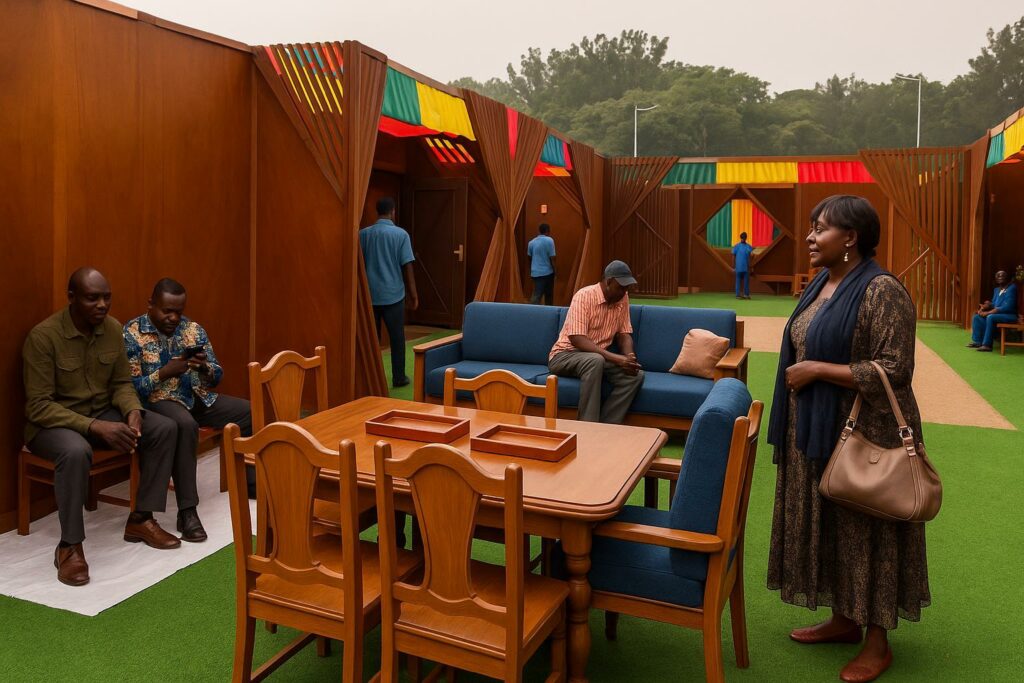A strategic showcase under presidential impetus
When the doors of the International Wood, Machine and Craft Fair of Brazzaville (SAMEB) opened on 11 August, the event was not simply adding colour to the cultural calendar; it was articulating a deliberate economic posture. Now in its fourth iteration, SAMEB has been endorsed by President Denis Sassou Nguesso as a flagship for the Republic of Congo’s agenda to dilute hydrocarbon dependency through value-added forestry and artisanat. The fair’s declared targets—job creation, industrial upgrading and foreign direct investment—mirror the diversification objectives outlined in the National Development Plan 2022-2026 (Government of Congo 2022).
Wood value chains and industrial policy alignment
Congo-Brazzaville enjoys one of Central Africa’s richest forest reserves, yet historically 80 percent of exported timber left the country in log form (FAO 2022). SAMEB seeks to rewrite that statistic by promoting downstream transformation in carpentry, high-end furniture, parquet and sculptural art. According to figures released by the Ministry of Small and Medium-sized Enterprises and Handicrafts, local processing could lift forestry’s contribution to GDP from the current 6 percent to nearly 10 percent within five years, if latent capacity is unlocked through technology transfer and cluster finance. At the fair, domestic firms shared exhibition space with machinery suppliers from Morocco and Angola, illustrating a gradual integration of continental value chains.
Artisanat as soft power and cultural diplomacy
Beyond balance-of-payments arithmetic, SAMEB functions as a platform of cultural projection. The Congolese pavilion blended Kuyu-inspired masks with modern design cues, a juxtaposition that, according to curator Aline Odzali, ‘speaks to a nation simultaneously rooted and outward-looking’. Cultural diplomacy scholars frequently cite craft industries as trust-builders—an observation borne out by the presence of delegates from Namibia and the Democratic Republic of Congo who signed letters of intent for joint exhibitions in 2026. Soft-power dividends are rarely quantifiable, yet they inform an environment conducive to commercial negotiation.
Investor confidence and regulatory signals
International financiers interviewed in Brazzaville emphasised predictability of regulation as pivotal for capital inflows. Finance Minister Rigobert Roger Andely reiterated that Congo’s 2022 Forestry Code obliges operators to process 100 percent of logs domestically by 2025, while offering fiscal incentives for factories employing at least 200 artisans. The International Finance Corporation noted a ‘moderate improvement’ in the ease-of-doing-business metrics within the wood segment over the past two years, pointing to streamlined customs clearances at Pointe-Noire port. These measures, coupled with concessional credit lines from the Development Bank of Central Africa, render the sector increasingly bankable, according to analysts at Ecobank Research.
Social dividends and gender dynamics
Minister Jacqueline Lydia Mikolo used her plenary address to underline a consumption paradox: many Congolese overlook locally produced goods in favour of imported imitations. To tackle perception gaps, the ministry is piloting a ‘Made in Congo’ labelling scheme, complemented by public-sector procurement quotas. Early evaluations indicate that each new small workshop generates three to five direct jobs, with women filling almost half of these positions, a statistic welcomed by UN Women observers on site. The fair’s side-events, including workshops on digital marketing for crafts, signalled a commitment to inclusivity that resonates with the Sustainable Development Goals.
Outlook: measured optimism amid structural hurdles
Despite upbeat indicators, structural challenges endure. Transport logistics across a territory of 342,000 square kilometres remain costly, and access to certified sustainable timber is uneven, threatening competitiveness in eco-conscious markets. The government’s partnership with the Central African Forest Initiative to expand traceability platforms could mitigate such risks, but will demand rigorous enforcement capacity. Diplomats posted in Brazzaville conclude that SAMEB’s true test will arrive after the closing ceremony, as memoranda transition into factories and pay-slips. For now, the fair has demonstrated that wood and artisanat are no longer peripheral cultural tokens; they are entering the centre of Congo-Brazzaville’s economic narrative with a seriousness that warrants international attention.

